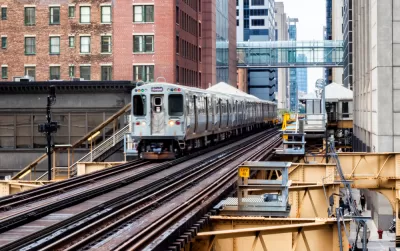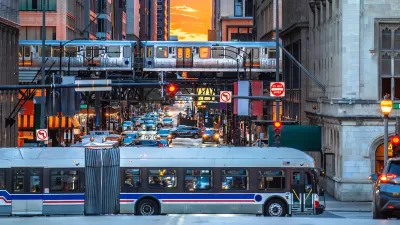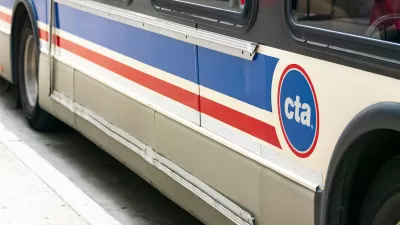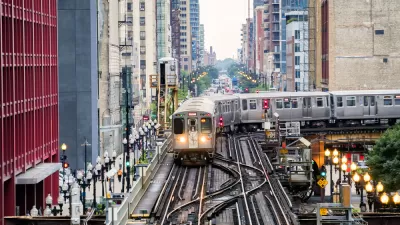The region’s transit riders could see major fare hikes and reduced service if agencies don’t find new ways to make up for reduced fare revenues.

Without new funding sources, the Chicago Transit Authority could be forced to raise fares and reduce service by 2026, warns Dan Zukowski in Smart Cities Dive.
The Regional Transportation Authority of Northern Illinois acknowledges the heavy reliance of Chicago-area transit agencies on fare revenue is unsustainable. The agency faces a $730 million budget shortfall in 2026.
The RTA released a five-year strategic plan that seeks to address this and other problems facing the region’s transit. “Advocacy issues include finding additional funding for transit operations and infrastructure that reduce the Authority’s reliance on the farebox. Action items aim to address public safety concerns, accessibility, customer convenience and transitioning to a near-zero emission regional transit system.”
If the plan fails to gain political support and bring in the needed funding, Zukowski explains, “One-way fares for Chicago Transit Authority elevated trains, Metra trains and Pace buses would double. That would make Chicago’s trains and buses some of the most expensive in the country, the RTA states in the plan document.” The plan admits that this could backfire and lead to even lower ridership.
Zukowski points out the long history of public transit in Chicago, where the first elevated train began running in 1892 and more than a million people use the region’s trains and buses daily.
FULL STORY: Chicago transit users could see fare hikes, service cuts without new funding sources

Planetizen Federal Action Tracker
A weekly monitor of how Trump’s orders and actions are impacting planners and planning in America.

Maui's Vacation Rental Debate Turns Ugly
Verbal attacks, misinformation campaigns and fistfights plague a high-stakes debate to convert thousands of vacation rentals into long-term housing.

San Francisco Suspends Traffic Calming Amidst Record Deaths
Citing “a challenging fiscal landscape,” the city will cease the program on the heels of 42 traffic deaths, including 24 pedestrians.

Defunct Pittsburgh Power Plant to Become Residential Tower
A decommissioned steam heat plant will be redeveloped into almost 100 affordable housing units.

Trump Prompts Restructuring of Transportation Research Board in “Unprecedented Overreach”
The TRB has eliminated more than half of its committees including those focused on climate, equity, and cities.

Amtrak Rolls Out New Orleans to Alabama “Mardi Gras” Train
The new service will operate morning and evening departures between Mobile and New Orleans.
Urban Design for Planners 1: Software Tools
This six-course series explores essential urban design concepts using open source software and equips planners with the tools they need to participate fully in the urban design process.
Planning for Universal Design
Learn the tools for implementing Universal Design in planning regulations.
Heyer Gruel & Associates PA
JM Goldson LLC
Custer County Colorado
City of Camden Redevelopment Agency
City of Astoria
Transportation Research & Education Center (TREC) at Portland State University
Jefferson Parish Government
Camden Redevelopment Agency
City of Claremont





























